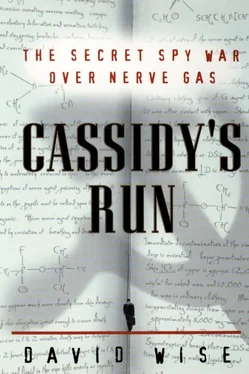In Salt LakeCity, where he had been sent to bug and wiretap the Lopezes, George Owen was alarmed at what he saw. FBI agents there, more attuned to following around bank-robbery suspects than Russian spies, were too obvious to suit Owen, according to Charlie Bevels. “Owen came back and told headquarters, ‘I’ve watched those guys handling surveillance. Every bureau car has antennas nineteen feet high.’”
Hearing of Owen’s dismaying report, Robert J. Schamay, an FBI counterintelligence agent in Washington, urged that something be done, fast. Schamay, six foot four with the frame of a linebacker, volunteered and became the case agent in Salt Lake City.
Wiretapping and bugging the Lopezes had presented problems, Schamay remembered. “They lived in married housing at the university with one child, the little boy. They were in a two-story concrete building, on the top floor. George had put in the technical coverage, but it was hard to do in a concrete building.” Owen installed a dual-purpose microphone that tapped the phones and also allowed the FBI to overhear room conversations. The microphone was concealed in a wall telephone; the FBI had managed to gain access to the spies’ apartment long enough to switch the wall phone for an identical “hot” unit. The bureau had also installed a remote surveillance camera, trained on the entrance to the building, that transmitted its pictures to a television screen in the FBI’s office downtown. Agents conducted physical surveillance of the couple as well.
Since illegals working as Soviet spies are rarely identified, the bureau wanted to learn as much as possible about the Lopezes and their actions. Eugene Peterson, supervising the case from FBI headquarters, decided to insert an undercover agent who would have the difficult and delicate mission of trying to become close to the PALMETTOS.
Peterson reviewed the files of several hundred FBI agents, looking for just the right candidate. Finally, he narrowed the field to fourteen agents with Hispanic backgrounds. From the list, Peterson zeroed in on Aurelio Flores, a twenty-nine-year-old agent in Miami. Not only was Flores of Mexican-American background and bilingual in Spanish and English, he was almost exactly the age of Gilberto Lopez.
Peterson sent the paperwork up to John P. Mohr, the number-three official of the bureau. Mohr noticed that Flores had a toddler.
“What about the child?” he asked. “There might be a security problem.”
Peterson was incredulous. “He’s only eighteen months old,” he protested.
“Yeah,” Mohr said, “but my grandson is eighteen months and he says, ‘Grandpa G-man.’”
Mohr had a point, although as events were to unfold, it was not the undercover agent’s child who talked out of turn. Headquarters approved Peterson’s choice, and Flores prepared to move to Salt Lake City with his wife and son.
Peterson arranged a new résumé for Flores. Peterson contacted a former FBI man who was chief of personnel security for a large private corporation in Miami, and the ex-agent agreed to insert a fake employment record for Flores into the company’s files.
Aurelio Flores, a compact man with brown hair and hazel eyes, was born in Del Rio, Texas, graduated from Saint Mary’s University in San Antonio, and served as a captain with the army airborne special forces for five years before he joined the FBI in 1970.
To go undercover in Salt Lake City, ideally Flores would have used a completely new identity with backstopped documentation. There was a problem, however. Since the plan was for Flores to approach Lopez as a fellow student, Flores applied for admission to the University of Utah as a graduate student in geography.“We would have had to change my college transcripts if I used another name,” he said.“I used my own name.”
If Flores succeeded in befriending Lopez, it was possible that the Soviets might check on his background. As a precaution, the bureau asked various government agencies and private companies to alert it if anyone made inquiries about Flores. “We checked to make sure no one was checking on me. We had ‘stops’ at different places [so that] in case they were asking questions, we would know.”
Flores was accepted by the university and arrived on campus in January 1972. Lopez, he discovered, was an avid badminton player, and Flores briefly considered approaching him as a fellow enthusiast. He decided there was a better way.
The PALMETTOS had enrolled their two-year-old son, Nayar, at a Montessori school day-care center not far from the university. Flores did the same with his son.
“The first time I went to the day-care center, I parked behind his car and locked him in. So he had to wait until I left to get out.”
In the parking lot, Flores apologized in Spanish for blocking Lopez.
“Dispénsame,” Flores said, excusing himself. “I’ll get out of your way.”
“No problem,” Lopez replied. He seemed pleased to meet another Spanish-speaking parent.
In the days that followed, as they both visited the day-care center, Flores gradually got to know Lopez. “We had to wait for the children, and I introduced myself.”
Soon, they became friends. Flores was patient. Lopez liked to talk politics, and Flores made a point of being a good listener. “I listened to his ideas on Marxism and Stalin. He was an admirer of Stalin.
“One day [the PALMETTOS] were going to a function at the anthropology department. There were poetry readings for visiting scholars, that sort of thing. They asked me to baby-sit.”
Headquarters could scarcely have expected Flores to get any closer to the target. It might have been unprecedented in the annals of espionage: A Russian spy had unknowingly asked an FBI agent to baby-sit for him.
Whenever Lopez planned to travel to Mexico, or to Florida to service one of Cassidy’s drops, he told Flores that he was getting ready to take a trip. Of course, from the wiretaps on his apartment, the FBI usually knew that.
Although Flores had not worked undercover before, he proved to be ingenious and creative. One night, Flores and his wife invited Gilberto and Alicia to their home. “I had him over to dinner and saved all the glasses so we had a full set of prints from him and from her. We loaded the plates into the dishwasher, but they didn’t notice we didn’t put the glasses in. We got very good prints.”
Lopez and his wife had very different personalities, Flores recalled. “She was a good swimmer; he was afraid of the water. So sometimes I could get her at the deep end of the pool and talk to her alone. He would stay in the shallow end. She spoke French, some German. She had traveled through France and had lived with a family in France. She was quite a linguist.
“He was more gregarious, talkative, would have made a hell of a salesman. Go right up to you at a party and start talking. She was more the quiet, intellectual one.” But Alicia made one basic conviction clear, Flores said. “She hated Americans.”
Similarly, Lopez trusted Flores only because of his Mexican background. “Once Gilberto told the two kids, mine and his, that they must always be friends and not fight. He said to them, ‘You must get a pencil and stick it into the blue eyes of the gringos.’”
Lopez was paid well for his espionage work. “The Soviets were paying him in cash every time he made a pickup. We had access to his bank accounts. After each visit to a drop site in Florida he would make a deposit in his bank account. They would pay him between eight thousand and twelve thousand dollars per drop.” Out of the total, however, Lopez had to pay his tuition and travel expenses.
From the wiretaps, the FBI learned that Lopez was planning to move with his family to Austin in 1972. The Mexican had received a Ford Foundation grant to study anthropology at the University of Texas.
Читать дальше












